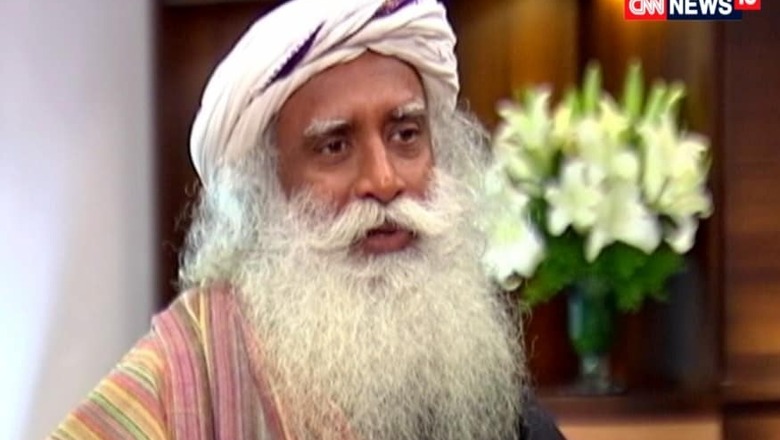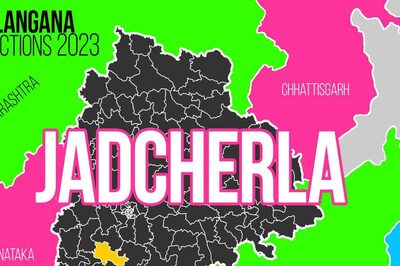
views
As India looks to battle its border concerns and address the woes of its farmers, Sadguru lists the five steps the country should take to tide over its troubles.
Fixing the Borders
A nation exists only because of its borders. You can call something a nation first and foremost because there is a geographical border. People can change their language, their religion, beliefs and ideologies, but it is the geography which is the first dimension of making of a nation. So this sovereignty of India should not have been dragged on for so long after Independence. It should have been settled immediately. I don't want to make a political post mortem now, but it was a serious mistake not to fix the boundaries. Still it is a Line of Control, which is always out of control. It’s not a national border. The first thing we must ensure is the sovereignty of the nation. We have already been ravaged by partition — we need to tighten this so that these kind of situations do not happen again. Without a clear definition of national sovereignty, the nation shall be distressed for always and this must be solved.
Protecting the Soil
Another important aspect is that India’s soil is right now under great threat. Soil can be kept rich and alive. I say “alive” because what you think as yourself right now is just soil. Unfortunately, most people do not get it until you bury them. In India, we have a latitudinal spread from Kanyakumari to the Himalayan ranges. If we take care of the soil, we can grow just about anything you want in the world. We have the land, the right kind of climate, and above all, skilled people. This is a land with over 12,000 years of agricultural history. We have been plowing, growing and eating from the same soil, but in one generation, slowly we are turning it into sand. If the land has to be rich, it means the leaves from the trees and animal waste have to go into the soil. The trees are long gone and the animals are all getting exported. If the animals and trees are gone, you cannot keep the land rich. We have to bring back laws where if you own land, you must own animals, otherwise the soil will be destroyed. Keeping the soil rich and alive is one of the top priorities for the country.
Making Farming Lucrative
If you survey or ask farmers how many of them want their children to get into agriculture, it is well below five per cent. So in another 20 years’ time, you will lose the ability to grow food for such a huge population. Making mud into food is not a small thing. If you lose the skill to grow your own food, what will happen to you?
If we want to ensure our food security, we have to make sure farming becomes one of the most lucrative processes. That is when people will invest their children in farming, otherwise they will all go elsewhere, which is happening right now. We are running a major movement to see how to make agriculture attractive and sustainable for farmers. What is lacking in agriculture is scale — the average landholding is just a little over two acres and at that level, farmers cannot prosper. So, we are trying to bring scale without compromising land ownership by the way of irrigation investments and marketing processes. We have done this through Farmers Producers Organisations, which are growing in the country in a big way. Much has been done, but we are trying to bring 10,000-25,000 farmers together, so that they operate as one.
Earlier, there was a tax which made it difficult for farmers to get together and operate. But we have worked with the government to get a tax benefit for them, so that they can work on a larger scale — and this is what is needed. Farmers must experience the power of scale. If that one thing happens, farming will become lucrative.
Education
Along with this, India's education has to be seriously looked at. Unfortunately, because of compulsory education, many of the skills in India are dying out. This is not about destroying our education system in the name of family traditions. That is not the point. What I am saying is, every human being is not necessarily suited for academic education. There must be a variety of offerings, so that just because you cannot understand chemistry, you are not made to feel stupid — you can do something else. At least parents must be given the liberty to choose. If a farmer, carpenter or weaver wants to teach their craft to their children, they should be allowed to do that. Especially if the weavers do not pass on their skills to their children, then the weaving tradition in the country will be over in another generation. The idea is to reduce the syllabus by fifty per cent, so that the rest of the time can be focused on learning other skills. Only with the next generation growing into a complex web of competence will the nation prosper.
Save the Weave
This is why we launched a movement called “Save the Weave”. Recently, we took 120 distinct weaves from India and presented them to some of America’s top designers during a fashion show in New York City. There is no other nation on the planet which has the kind of weaves that we have — and it is all made by hand. If this has to develop, it will not happen just by finishing high school at the age of eighteen and trying to learn it. It needs dedicated focus. For this to happen, the education process needs to be relaxed a bit.
We have to bring back what we are good at because at one time India was the largest economy on the planet. Our main source of income was spice but at one point, textiles overtook that. The whole of Europe was clothed by us until the British decided to completely destroy the Indian textile industry between 1800 and 1860. If we bring back the weaving industry, it will make a big difference for the economy and for the people of rural India.
(The author is Founder, Isha Foundation & Rally for Rivers)




















Comments
0 comment